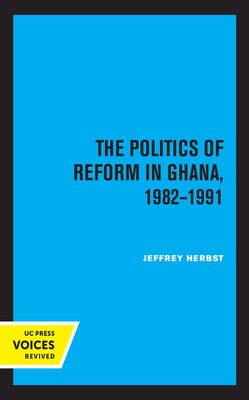
- We will send in 10–14 business days.
- Author: Jeffrey Herbst
- Publisher: University of California Press
- ISBN-10: 0520356500
- ISBN-13: 9780520356504
- Format: 15.2 x 22.9 x 1.4 cm, hardcover
- Language: English
- SAVE -10% with code: EXTRA
Reviews
Description
Economic reform was the most pressing question for African and other Third World countries during the 1980s. In this first full-length examination of the political economy of adjustment in Ghana, Jeffrey Herbst describes the causes of Ghana's dramatic economic decline and reviews the politics of reform that began in 1983. Since Ghana was one of the first African countries to adopt a comprehensive reform program and the one that has sustained adjustment longest, the Ghanaian experience has profound ramifications for debates regarding stabilization and structural change across the continent.
Herbst devotes special attention to the interaction between the type of government and the politics of adjustment, the reaction of interest groups such as urban labor and the peasantry, and the relationship between economic and political change. His extended field research and sophisticated knowledge of the issues involved, both from the economic and political science literature, make this study of importance not only to Africanists, political scientists, economists, and sociologists, but also to government and financial leaders wrestling with economic reform in developing countries.This title is part of UC Press's Voices Revived program, which commemorates University of California Press's mission to seek out and cultivate the brightest minds and give them voice, reach, and impact. Drawing on a backlist dating to 1893, Voices Revived makes high-quality, peer-reviewed scholarship accessible once again using print-on-demand technology. This title was originally published in 1993.
EXTRA 10 % discount with code: EXTRA
The promotion ends in 17d.21:14:14
The discount code is valid when purchasing from 10 €. Discounts do not stack.
- Author: Jeffrey Herbst
- Publisher: University of California Press
- ISBN-10: 0520356500
- ISBN-13: 9780520356504
- Format: 15.2 x 22.9 x 1.4 cm, hardcover
- Language: English English
Economic reform was the most pressing question for African and other Third World countries during the 1980s. In this first full-length examination of the political economy of adjustment in Ghana, Jeffrey Herbst describes the causes of Ghana's dramatic economic decline and reviews the politics of reform that began in 1983. Since Ghana was one of the first African countries to adopt a comprehensive reform program and the one that has sustained adjustment longest, the Ghanaian experience has profound ramifications for debates regarding stabilization and structural change across the continent.
Herbst devotes special attention to the interaction between the type of government and the politics of adjustment, the reaction of interest groups such as urban labor and the peasantry, and the relationship between economic and political change. His extended field research and sophisticated knowledge of the issues involved, both from the economic and political science literature, make this study of importance not only to Africanists, political scientists, economists, and sociologists, but also to government and financial leaders wrestling with economic reform in developing countries.This title is part of UC Press's Voices Revived program, which commemorates University of California Press's mission to seek out and cultivate the brightest minds and give them voice, reach, and impact. Drawing on a backlist dating to 1893, Voices Revived makes high-quality, peer-reviewed scholarship accessible once again using print-on-demand technology. This title was originally published in 1993.


Reviews